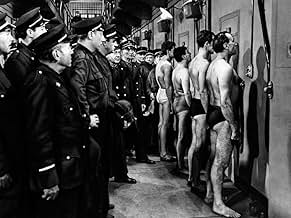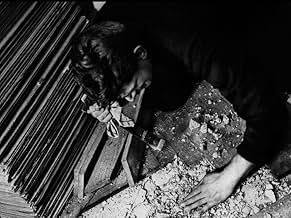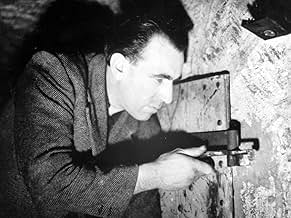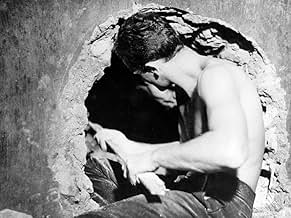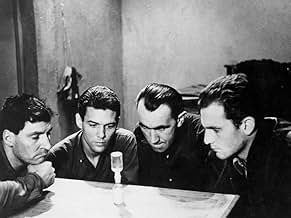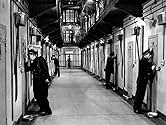Distrust and uncertainty arise when four long-term inmates cautiously induct a new prisoner into their elaborate prison-break scheme.Distrust and uncertainty arise when four long-term inmates cautiously induct a new prisoner into their elaborate prison-break scheme.Distrust and uncertainty arise when four long-term inmates cautiously induct a new prisoner into their elaborate prison-break scheme.
- Nominated for 2 BAFTA Awards
- 2 wins & 4 nominations total
Marc Michel
- Claude Gaspard
- (as Mark Michel)
Jean-Paul Coquelin
- Le lieutenant Grinval
- (as J. Paul Coquelin)
Albert Augier
- Un gardien
- (uncredited)
Jean Becker
- Un gardien
- (uncredited)
Mick Besson
- Deuxième plombier
- (uncredited)
Georges Bielec
- Figurant
- (uncredited)
Raymond Bour
- Un gardien
- (uncredited)
Philippe Dumat
- Un gardien
- (uncredited)
Gérard Hernandez
- Le détenu à l'infirmerie
- (uncredited)
Jean Luisi
- Un détenu
- (uncredited)
Storyline
Did you know
- TriviaThe scene where three different characters take turns breaking through the concrete floor of their cell is filmed in a single, nearly four minute long, shot.
- GoofsWhen Geo checks the corridor with the mirror and takes a break to say goodbye to his cellmates, he leaves the mirror in the hole. However, when he goes back to checking the corridor he has to stick the mirror back into the hole first.
- Quotes
[last lines]
Roland Darban: [stripped, facing the wall under guard] Poor Gaspard.
- ConnectionsFeatured in Mon père, il m'a sauvé la vie (2001)
Featured review
Immediate background:Jacques Becker was dying when he filmed "le trou,and he made it his legacy;it's the tragedy of man caught on the web of life -an admirable metaphor shows two wardens feeding a spider in the undergrounds with a fly-,and anyway unable to escape from the final death.
The first thing to bear is mind is that,calling "le trou" a "prison movie" would be an insult.Although adapted from a Jose Giovanni's book -Giovanni had been himself in jail for some time and his depictions are as close to reality as can be-,Becker masterfully transcends his subject and gives something definitely new.Some said it was the final link between "la nouvelle vague" and what the highbrows pejoratively -and thoroughly unfairly- call "cinema de qualité" but Becker had predated that overrated new wave by almost ten years :"rendez-vous de juillet" had already almost everything the young Turks would bring later.
First shock is the use of the wide screen,the cinemascope,which Becker had never experimented before;and he achieved the impossible: using this device for a story which takes place ,either in the four walls of a jail,or in the undergrounds and the sewers .The only picture of the outside is seen when the two inmates open a manhole.And the second one is the sound:there's no music at all,except for the final cast and credits -saving the cast and credits for the end was very rare in the contemporary French cinema -But the soundtrack resembles some kind of musique concrete with its relentless thumps, the whispers and the screams inside the cell,the creaking of the doors ,the waters in the sewer;and the final cacophony -which is not unlike the one which Manliewicz used in "suddenly last Summer" the year before- packs a real wallop.
Another Becker's tour de force is his description of the prison life:he avoids all the clichés that mar so many "prison movies" (the overpraised "Whatsisname redemption" is no exception):here, the wardens are,most of the time ,kind and friendly,the relationships with the inmates remain polite ,maybe sometimes too much:particularly those between the young man (Marc Michel) and the head warden are almost paternalistic.
Another Becker's permanent feature comes back to the fore in "le trou" :friendship,solidarity ,which was already present in "rendez-vous de juillet" and "touchez pas au grisbi".Here it's pure manly friendship and it seems that a certain misogyny is infiltrating Becker's world:during the 2 hours + running time of the movie,we only see one young girl (Catherine Spaak) behind a grille,for a very short while.The only positive woman whom we' ll never see is (naturally) one of the five inmates ' s(Michel Constantin) mother("I almost killed her when I was sent to jail so I do not want to take a chance and try to escape")
SPOILER:But even this world where five inmates share everything,where their friendship is "more than I 've ever had "(Marc Michel's character) is collapsing;the first cracks were already here in "rendez-vous de juillet" when some of the young students were giving up on their plans ,to the main hero's (Daniel Gelin)disappointment.But "touchez pas au grisbi" took friendship over everything including money."Le trou" reveals the true nature of man,even if the informer seems completely desperate at the end of the movie.The mammoth task they did ,the hole '(le trou) is nothing but a cul-de -sac and it epitomizes,in a Hustonian way -we're closer to Huston than to Godard ,fortunately,the vanity of everything man can do to escape from his fate,and in the case of Becker ,to escape from death.END OF SPOILER
Had Becker ended his career with his three precedent movies (Ali-Baba,Arsène Lupin ,Montparnasse 19),his former masterpieces (Casque d'or,Goupi Main Rouges ,rendez-vous de juillet),could have been tarnished by association.But "Le trou" ,his final masterpiece stands in little danger of bringing this about.
The first thing to bear is mind is that,calling "le trou" a "prison movie" would be an insult.Although adapted from a Jose Giovanni's book -Giovanni had been himself in jail for some time and his depictions are as close to reality as can be-,Becker masterfully transcends his subject and gives something definitely new.Some said it was the final link between "la nouvelle vague" and what the highbrows pejoratively -and thoroughly unfairly- call "cinema de qualité" but Becker had predated that overrated new wave by almost ten years :"rendez-vous de juillet" had already almost everything the young Turks would bring later.
First shock is the use of the wide screen,the cinemascope,which Becker had never experimented before;and he achieved the impossible: using this device for a story which takes place ,either in the four walls of a jail,or in the undergrounds and the sewers .The only picture of the outside is seen when the two inmates open a manhole.And the second one is the sound:there's no music at all,except for the final cast and credits -saving the cast and credits for the end was very rare in the contemporary French cinema -But the soundtrack resembles some kind of musique concrete with its relentless thumps, the whispers and the screams inside the cell,the creaking of the doors ,the waters in the sewer;and the final cacophony -which is not unlike the one which Manliewicz used in "suddenly last Summer" the year before- packs a real wallop.
Another Becker's tour de force is his description of the prison life:he avoids all the clichés that mar so many "prison movies" (the overpraised "Whatsisname redemption" is no exception):here, the wardens are,most of the time ,kind and friendly,the relationships with the inmates remain polite ,maybe sometimes too much:particularly those between the young man (Marc Michel) and the head warden are almost paternalistic.
Another Becker's permanent feature comes back to the fore in "le trou" :friendship,solidarity ,which was already present in "rendez-vous de juillet" and "touchez pas au grisbi".Here it's pure manly friendship and it seems that a certain misogyny is infiltrating Becker's world:during the 2 hours + running time of the movie,we only see one young girl (Catherine Spaak) behind a grille,for a very short while.The only positive woman whom we' ll never see is (naturally) one of the five inmates ' s(Michel Constantin) mother("I almost killed her when I was sent to jail so I do not want to take a chance and try to escape")
SPOILER:But even this world where five inmates share everything,where their friendship is "more than I 've ever had "(Marc Michel's character) is collapsing;the first cracks were already here in "rendez-vous de juillet" when some of the young students were giving up on their plans ,to the main hero's (Daniel Gelin)disappointment.But "touchez pas au grisbi" took friendship over everything including money."Le trou" reveals the true nature of man,even if the informer seems completely desperate at the end of the movie.The mammoth task they did ,the hole '(le trou) is nothing but a cul-de -sac and it epitomizes,in a Hustonian way -we're closer to Huston than to Godard ,fortunately,the vanity of everything man can do to escape from his fate,and in the case of Becker ,to escape from death.END OF SPOILER
Had Becker ended his career with his three precedent movies (Ali-Baba,Arsène Lupin ,Montparnasse 19),his former masterpieces (Casque d'or,Goupi Main Rouges ,rendez-vous de juillet),could have been tarnished by association.But "Le trou" ,his final masterpiece stands in little danger of bringing this about.
- dbdumonteil
- Dec 17, 2003
- Permalink
- How long is The Hole?Powered by Alexa
Details
- Release date
- Countries of origin
- Language
- Also known as
- The Night Watch
- Production companies
- See more company credits at IMDbPro
Box office
- Gross US & Canada
- $34,588
- Opening weekend US & Canada
- $6,756
- Jul 2, 2017
- Gross worldwide
- $34,588
- Runtime2 hours 11 minutes
- Color
- Aspect ratio
- 1.66 : 1
Contribute to this page
Suggest an edit or add missing content




